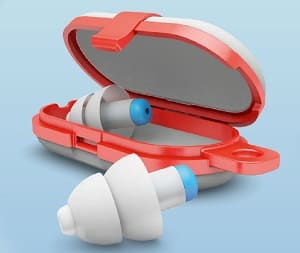Private Scuba › Diving › Health & Safety › Earplugs
Ear Plugs and Scuba Diving
There are several valid reasons for inserting earplugs into the ears, such as blocking out noise and preventing the condition known as swimmer's ear (otitis externa).
Even so, this guide explains why dive safety organisations do not endorse or encourage the use of ear plugs when scuba diving.
Can You Use Earplugs While Scuba Diving?
In fact, many of the scuba diving questions that we get from beginners relates to ear safety, such as:
- Are ear plugs safe to use when I go scuba diving?
- Can someone with an ear infection or a ruptured eardrum wear tubes in their ears?
- What does the Divers Alert Network medical line recommend?
The device occludes the external ear canal, and the primary purpose is to block the pressure of water on the eardrum.
Pro Tip: There are certain circumstances when individuals might use the plugs to keep the external auditory canal dry. Even so, the general recommendation is for scuba divers not to go diving with earplugs.
Reasons to Avoid Scuba Diving with Ear Plugs
Most earplug manufacturers are targeting people who want to wear these devices for 'dryness', such as swimmers and surfers.
In this case, the consequences of injury are low because there is no pressure change occurring at the surface. But, the health and safety issues in scuba diving - with respect to earplug use - can be disastrous.
Here's the thing:
When students learn how to equalise ear pressure underwater they use several different techniques. Often, they'll master the Valsalva manoeuvre of pushing air through the Eustachian tubes.
It is a narrow passage. So it's important to equalise early and often to avoid a build up of pressure. Students learn to ascend a little and try again if this happens.
A successful equalisation occurs when the pressure in the middle-ear space matches the ambient pressure exerted on the outside of the tympanic membrane.
 So, what happens to scuba divers when they use traditional earplugs?
So, what happens to scuba divers when they use traditional earplugs?
Simply put, the block created at the end of the external ear canal creates an extra air space that the human anatomy is unable to equalise.
It gets worse:
As the surrounding (ambient) pressure increases on the way down, it's going to push the plug further into the ear opening.
Imagine this. The pressure increases on the outside and the pressure decreases in the extra air spaces created between the earplug and the eardrum.
In most cases, this mechanism will make the tympanic membrane bow outward. Descending further will create a pressure imbalance so intense that it can actually cause a ruptured eardrum.
What about Using Vented Earplugs?
In fact, vented earplugs allow some water to get inside the external auditory canal. Thus, as the water enters the vent, it will start to fill the extra air space (e.g. as the volume decreases).
Some scuba divers might try using earplugs to reduce the effect of caloric vertigo (unequal vestibular stimulation from cold water). Even so, vented plugs may have the same risks as traditional devices if they become blocked.
Furthermore, any buildup of dirt or cerumen (earwax) that blocks the vented plugs could have the same effect as the traditional device, and may actually result in ear barotrauma.
Important: Complications underwater (e.g. removing an earplug) may place the diver at risk of an injury. Despite some suppliers marketing their devices to scuba divers, DAN does not endorse (or encourage) the use of earplugs while scuba diving.
Vented Freediving Ear Plugs
The simple answer to the popular question of [can you use earplugs when freediving] is yes you can. Nonetheless, you must (both):
- Wear proper equipment manufactured for freedivers (e.g. vented earplugs).
- Equalise your air spaces, including the ears. Wearing ear plugs does not remove the need for equalisation.
Pro Tip: Another section explains the full process of learning how to freedive. But, independent research on using earplugs while freediving is limited.
Related Information and Help Guides
- Can You Get Certified for Scuba Diving with Asthma?
- Can You Scuba Dive with Type 1 and Type 2 Diabetes?
- High-Pressure Ophthalmology and Diving (Ocular Hypertension)
- What is the Most Serious Lung Overexpansion Injury?
- What is Uvulitis and How Does a Swollen Uvula affect Divers?
- What's the Meaning of Health and Safety Rules in Scuba?
Important: The short tutorial video [2:31 seconds] presented by DAN® explains more about the physics and pressure effects on the human ear when we descend in water.